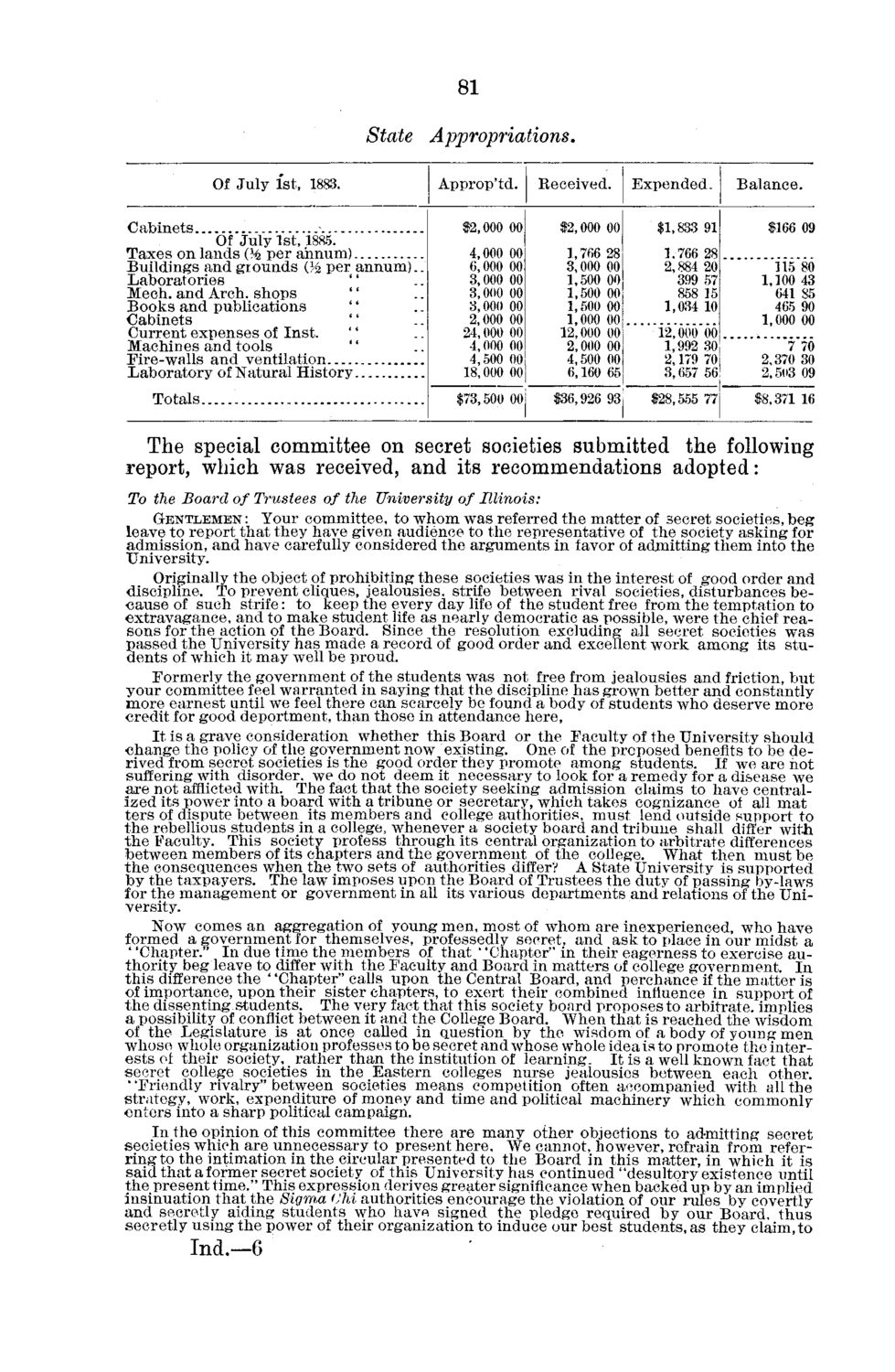| |
| |
Caption: Board of Trustees Minutes - 1886
This is a reduced-resolution page image for fast online browsing.

EXTRACTED TEXT FROM PAGE:
81 State Of J u l y 1st, 1883. Cabinets \ Of J u l y 1st, 1885. T a x e s on l a n d s (% p e r annum) Buildings and g r o u n d s (% per a n n u m ) . . Laboratories Mech. a n d Arch, shops '' B o o k s a n d publications " Cabinets " C u r r e n t e x p e n s e s of I n s t . " Machines and tools " Fire-walls a n d ventilation L a b o r a t o r y of Natural History Totals Appropriations. Approp'td. $2,000 00 4,000 6,000 3,000 3,000 3,000 2,000 24,000 4,000 4,500 18,000 00 00 00 00 00 00 00 00 00 00 Received. $2,000 00 1,766 3,000 1,500 1,500 1,500 1,000 12,000 2,000 4,500 6,160 28 00 00 00 00 00 00 00 00 65 Expended. '$1,833 91 1.766 2,884 399 858 1,034 12,000 1,992 2,179 3,657 28 20 57 15 10 00 30 70 56 Balance. $166 09 115 1,100 641 465 1,000 80 43 85 90 00 7 70 2,370 30 2,5(»3 09 $8,371 16 $73,500 00 $36,926 93 $28,555 77 The special committee on secret societies submitted the following report, which was received, and its recommendations adopted: To the Board of Trustees of the University of Illinois: GENTLEMEN: Your committee, to whom was referred the matter of secret societies, beg leave to report that they have given audience to the representative of the society asking for admission, and have carefully considered the arguments in favor of admitting them into the University. Originally the object of prohibiting these societies was in the interest of good order and discipline. To prevent cliques, jealousies, strife between rival societies, disturbances because of such strife: to keep the every day life of the student free from the temptation to extravagance, and to make student life as nearly democratic as possible, were the chief reasons for the action of the Board. Since the resolution excluding all secret societies was passed the University has made a record of good order and excellent work among its students of which it may well be proud. Formerly the government of the students was not free from jealousies and friction, but your committee feel warranted in saying that the discipline has grown better and constantly more earnest until we feel there can scarcely be found a body of students who deserve more credit for good deportment, than those in attendance here, It is a grave consideration whether this Board or the Faculty of the University should change the policy of the government now existing. One of the proposed benefits to be derived from secret societies is the good order they promote among students. If we are not suffering with disorder, we do not deem it necessary to look for a remedy for a disease we are not afflicted with. The fact that the society seeking admission claims to have centralized its power into a board with a tribune or secretary, which takes cognizance of all mat ters of dispute between its members and college authorities, must lend outside support to the rebellious students in a college, whenever a society board and tribune shall differ with the Faculty. This society profess through its central organization to arbitrate differences between members of its chapters and the government of the college. What then must be the consequences when the two sets of authorities differ*? A State University is supported by the taxpayers. The law imposes upon the Board of Trustees the duty of passing by-laws for the management or government in all its various departments and relations of the University. Now comes an aggregation of young men, most of whom are inexperienced, who have formed a government for themselves, professedly secret, and ask to place in our midst a ' 'Chapter." In due time the members of that ' 'Chapter" in their eagerness to exercise authority beg leave to differ with the Faculty and Board in matters of college government. In this difference the ' 'Chapter" calls upon the Central Board, and perchance if the matter is of importance, upon their sister chapters, to exert their combined influence in support of the dissenting students. The very fact that this society board proposes to arbitrate, implies a possibility of conflict between it and the College Board. When that is reached the wisdom of the Legislature is at once called in question by the wisdom of a body of young men whose whole organization professes to be secret and whose whole idea is to promote the interests of their society, rather than the institution of learning. It is a well known fact that secret college societies in the Eastern colleges nurse jealousies between each other. ' 'Friendly rivalry" between societies means competition often accompanied with all the strategy, work, expenditure of money and time and political machinery which commonly enters into a sharp political campaign. In the opinion of this committee there are many other objections to admitting secret secieties which are unnecessary to present here. We cannot, however, refrain from referring to the intimation in the circular presented to the Board in this matter, in which it is said that a former secret society of this University has continued "desultory existence until the present time." This expression derives greater significance when backed up by an implied insinuation that the Sigma (Jhi authorities encourage the violation of our rules by covertly and secretly aiding students who have signed the pledge required by our Board, thus secretly using the power of their organization to induce our best students, as they claim, to Ind.—6
| |